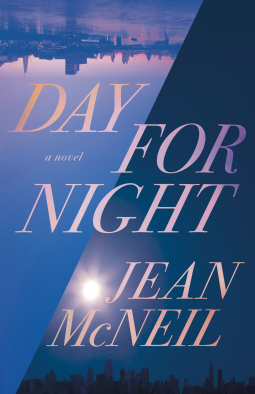
Day for Night
A Novel
by Jean McNeil
This title was previously available on NetGalley and is now archived.
Send NetGalley books directly to your Kindle or Kindle app
1
To read on a Kindle or Kindle app, please add kindle@netgalley.com as an approved email address to receive files in your Amazon account. Click here for step-by-step instructions.
2
Also find your Kindle email address within your Amazon account, and enter it here.
Pub Date May 25 2021 | Archive Date Jan 31 2021
Talking about this book? Use #DayforNight #NetGalley. More hashtag tips!
Description
Set in the throes of Brexit-era London, Day for Night is an unflinching exploration of desire, gender, and history, in which a married filmmaking duo seeks to tell the tragic story of 1940s German Jewish intellectual Walter Benjamin, while their own relationship and nation are imploding behind the camera in real-time
Richard Cottar is a respected independent film writer and director; his wife, Joanna, is his increasingly successful and wealthy producer. Together they are about to embark on a film about the life of Walter Benjamin, the German Jewish intellectual who killed himself in northern Spain while on the run from the Nazis in 1940. In what looks set to be the last year of Britain’s membership of the European Union, Benjamin’s story of exile and statelessness is more relevant than ever. But Richard and Joanna’s symbiotic life takes a sudden turn when they cast an intelligent, sexually ambiguous young actor in the role of Walter Benjamin. In a climate of fear and a bizarre, superheated year redolent of sex and hidden desire, Richard and Joanna must confront their relationship, Benjamin’s tragic history, and the future of their country.
Taking its cue from Virginia Woolf’s Orlando, Day for Night is an unsettling, riveting story of reversals — of gender, power, and history.
Available Editions
| EDITION | Other Format |
| ISBN | 9781770415751 |
| PRICE | $14.95 (USD) |
Featured Reviews
 Tim I, Reviewer
Tim I, Reviewer
Richard is a screenwriter and director of art house films. Joanna is a film producer. Married, with two near-adult children, living in London comfortably but by no means wealthy, the reader through them examines the complex elements that comprise one’s identity at middle age. And not just any middle age, but middle age today.
Jean McNeil’s Day for Night is the first book I have read that attempts to examine the morphing national identities in today’s western democracies on an individual level. For Joanne and Richard, the tacking towards conservative nationalism and away from liberal democracy means Brexit, a severing of ties with Europe. This has practical implications in how their new film can be financed but they also question what it now means for them to be British. For them an essential part of Britishness are the ties to other European countries, the open and unhindered travel, the opportunities for work and exchange. An element of what it means to be British is being cut away, severed, by Brexit and it’s being denied to them by other Britons.
The foil or mirror (I’m not sure what the best descriptor here is) for these convolutes of identity, politics, intellectualism, art, is the subject of Richard’s screenplay - a biography of the intellectual Walter Benjamin.
I downloaded the Kindle version of Howard Eiland and Michael Jennings’ biography of Walter Benjamin years ago (on March 3, 2015 in fact) but never got around to reading it. Seeing that Day for Night was going to be a story of a filmmaker doing a film on Benjamin’s life, I decided to pull up the Eiland/Jennings book and read that first in order to better familiarize myself with him.
I’m glad I took that approach. Day for Night can stand entirely on its own. No knowledge of Benjamin’s scholarship or life is required to enjoy this novel. But readers who do have a pre-existing familiarity with Benjamin will pick up the homophony in the unfolding story, the lyrical or melodic notes from the Weimar intellectual underpin the melody carried by Richard and Joanne.
When I wrote my review of the Eiland/Jennings biography, I noted that the politics of Benjamin’s age, especially in the 1930s, were not dissimilar to the trending politics of today (the outcome of America’s presidential election notwithstanding). It was also so clear to me how closely Benjamin identified with being European and that this, as much as anything, muted the occasional spikes of urgency to flee Europe as fascism gained power and literally gained ground.
McNeil set a huge job for herself here, creating an artistic vehicle to expose and examine the contemporary, living history of our times. The musings and concerns of the characters in Day for Night echo my own thoughts and the conversations had or observed by friends and colleagues. At the end of the book I felt…dissatisfied, a lack. The dissatisfaction wasn’t to do with McNeil’s skill as a writer. On the contrary, rather the dissatisfaction was an extension of the dissatisfaction, the lack, I feel as I probe my own sense of national identity. America, in my mind, has meant inclusivity and acceptance. Now it means divisiveness and intolerance? That’s the messaging I am struggling with and dissatisfied by. And, like Richard and Joanne, I’m doing so at middle age, with all its attendant career pressures and health concerns but also with the comforts of having established a place for myself amd family, of having a home.
A thought-provoking read and one that made me glad to be a thinker, to be reminded that there are others for whom the occupation of walking and thinking, maybe writing, is a worthy use of one’s time.
Thank you, #netgalley, for the #dayfornight ARC.



